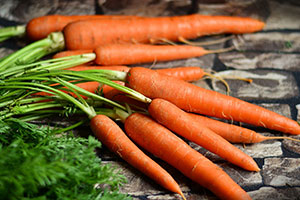
Carrots are a member of the Apiaceae botanical family, otherwise known as the carrot family, which also includes celery, parsnip, and various herbs such as anise, caraway, cilantro and coriander, cumin, dill and fennel.
Carrots are typically known as a root vegetable, but both the leaves and taproot (carrot) are edible.
Nutrition Information
One cup of carrots is an excellent source of vitamins A and K, and a good source of fiber, vitamin C, and potassium. Carrots also contain beta-carotene.
- Vitamin A supports reproduction, growth and development, immune function, and vision.
- Vitamin K is involved in blood clotting and building strong bones.
- Fiber helps you feel fuller faster, which can help control weight. Fiber also supports a healthy digestive system.
- Vitamin C is an antioxidant. Antioxidants can help prevent or slow damage of cells in the body caused by free radicals. Free radicals can lead to cell damage, which can be a factor in the development of cardiovascular disease and cancer.
- Potassium regulates blood pressure and fluid balance, and supports growth, development, and nervous system function.
- Beta-carotene is an antioxidant your body converts to make vitamin A.
Purchasing, Storing, and Preparing
- Purchase carrots year round at grocery stores or farmers markets during summer and fall.
- Carrots are mainly known as an orange vegetable, but other varieties can produce white, yellow, red, and purple carrots.
- Choose carrots that are firm with a deep color that is free from cracks, bruises, and soft spots.
- If purchasing carrots with green leafy tops, make sure the greens look fresh and vibrant.
- Store carrots in an unsealed plastic bag in the refrigerator for up to two weeks. Remove leaves prior to storing since they require more moisture and will dry out the carrot taproot.
- Keep the leaves and eat as a nutritious leafy green. Store greens in a glass of water or plastic bag in the refrigerator. The water should be changed daily if stored in a glass. Use carrot greens within 1 or 2 days of purchase.
- Prepare carrots by washing well to remove excess dirt. Peel the skin off with a vegetable peeler, if preferred.
- Slice, julienne, grate, or shred carrots as desired for your dish. Use raw or cooked, steam, roast, grill, or puree. Add to soups, casseroles, dips, and baked goods.
- Prepare carrot greens by rinsing thoroughly. Then, blanch, sauté, or add raw greens to a salad, smoothie, dip, or pesto. To preserve greens, dehydrate or freeze for later use.
Nutrition Facts
Carrot, raw 1/2 cup chopped
- Calories: 26
- Protein: 0.59 g
- Fat: 0.15 g
- Carbohydrate: 6.15 g
- Fiber: 1.79 g
- Calcium: 21.1 mg
- Iron: 0.192 mg
- Magnesium: 7.7 mg
- Phosphorus: 22.4 mg
- Folate: 12.15 µg
- Vitamin A: 535 µg
Via fdc.nal.usda.gov
Recipes
Request an Appointment